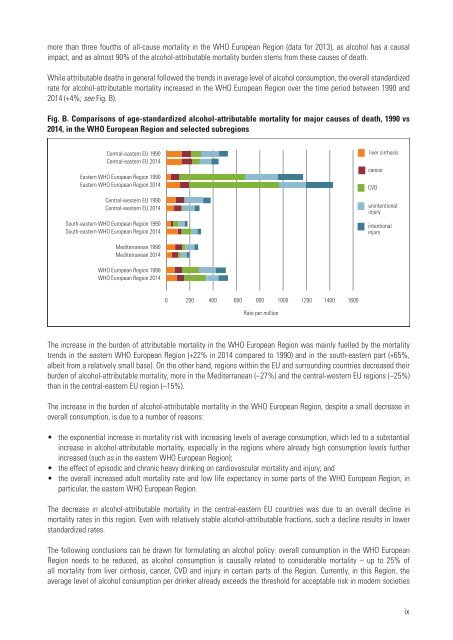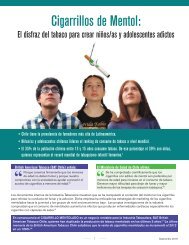Public health successes and missed opportunities
Public-health-successes-and-missed-opportunities-alcohol-mortality-19902014
Public-health-successes-and-missed-opportunities-alcohol-mortality-19902014
You also want an ePaper? Increase the reach of your titles
YUMPU automatically turns print PDFs into web optimized ePapers that Google loves.
more than three fourths of all-cause mortality in the WHO European Region (data for 2013), as alcohol has a causal<br />
impact, <strong>and</strong> as almost 90% of the alcohol-attributable mortality burden stems from these causes of death.<br />
While attributable deaths in general followed the trends in average level of alcohol consumption, the overall st<strong>and</strong>ardized<br />
rate for alcohol-attributable mortality increased in the WHO European Region over the time period between 1990 <strong>and</strong><br />
2014 (+4%; see Fig. B).<br />
Fig. B. Comparisons of age-st<strong>and</strong>ardized alcohol-attributable mortality for major causes of death, 1990 vs<br />
2014, in the WHO European Region <strong>and</strong> selected subregions<br />
Central-eastern EU 1990<br />
Central-eastern EU 2014<br />
Eastern WHO European Region 1990<br />
Eastern WHO European Region 2014<br />
Central-western EU 1990<br />
Central-western EU 2014<br />
South-eastern WHO European Region 1990<br />
South-eastern WHO European Region 2014<br />
liver cirrhosis<br />
cancer<br />
CVD<br />
unintentional<br />
injury<br />
intentional<br />
injury<br />
Mediterranean 1990<br />
Mediterranean 2014<br />
WHO European Region 1990<br />
WHO European Region 2014<br />
0 200 400 600 800 1000 1200 1400 1600<br />
Rate per million<br />
The increase in the burden of attributable mortality in the WHO European Region was mainly fuelled by the mortality<br />
trends in the eastern WHO European Region (+22% in 2014 compared to 1990) <strong>and</strong> in the south-eastern part (+65%,<br />
albeit from a relatively small base). On the other h<strong>and</strong>, regions within the EU <strong>and</strong> surrounding countries decreased their<br />
burden of alcohol-attributable mortality, more in the Mediterranean (–27%) <strong>and</strong> the central-western EU regions (–25%)<br />
than in the central-eastern EU region (–15%).<br />
The increase in the burden of alcohol-attributable mortality in the WHO European Region, despite a small decrease in<br />
overall consumption, is due to a number of reasons:<br />
• the exponential increase in mortality risk with increasing levels of average consumption, which led to a substantial<br />
increase in alcohol-attributable mortality, especially in the regions where already high consumption levels further<br />
increased (such as in the eastern WHO European Region);<br />
• the effect of episodic <strong>and</strong> chronic heavy drinking on cardiovascular mortality <strong>and</strong> injury; <strong>and</strong><br />
• the overall increased adult mortality rate <strong>and</strong> low life expectancy in some parts of the WHO European Region, in<br />
particular, the eastern WHO European Region.<br />
The decrease in alcohol-attributable mortality in the central-eastern EU countries was due to an overall decline in<br />
mortality rates in this region. Even with relatively stable alcohol-attributable fractions, such a decline results in lower<br />
st<strong>and</strong>ardized rates.<br />
The following conclusions can be drawn for formulating an alcohol policy: overall consumption in the WHO European<br />
Region needs to be reduced, as alcohol consumption is causally related to considerable mortality – up to 25% of<br />
all mortality from liver cirrhosis, cancer, CVD <strong>and</strong> injury in certain parts of the Region. Currently, in this Region, the<br />
average level of alcohol consumption per drinker already exceeds the threshold for acceptable risk in modern societies<br />
ix




